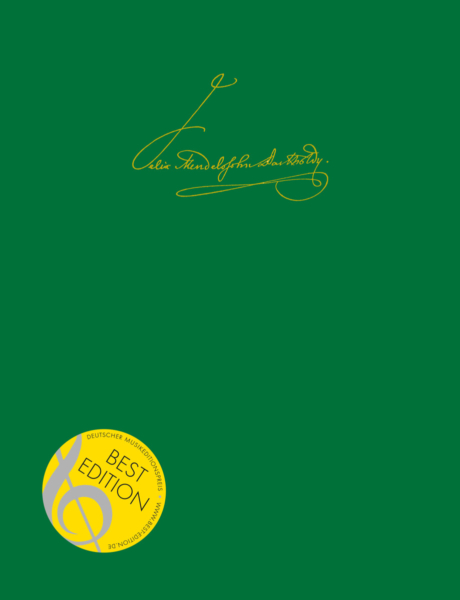Felix Mendelssohn Bartholdy (1809–1847) Leipziger Ausgabe der Werke von Felix Mendelssohn Bartholdy – SON 429
herausgegeben von der Sächsischen Akademie der Wissenschaften
Ausgezeichnet mit dem Deutschen Musikeditionspreis 2023
444 Seiten | 25 x 32 cm | 2.085 g | ISMN: 979-0-004-80309-7 | Leinen, Fadenheftung
Mit dem Kritischen Bericht zum Oratorium „Elias“ wird die fünfbändige Edition zu diesem Hauptwerk von Felix Mendelssohn Bartholdy abgeschlossen. Er präsentiert – ausnahmsweise in Form eines von den Notenausgaben separierten Bandes – die Zusammenfassung aller editorischen Kommentare, die insbesondere den Frühfassungen (Band V/11A) und der im Druck erschienenen Endfassung (Band V/11) des „Elias“ zugehörig sind. Mit der Ausgabe des Klavier-Auszugs (Band V/11B) und dem Band mit Skizzen und verworfenen Fassungen (Band V/11C) verschränkt sich der Kritische Bericht auf andere Weisen: Da sich für ersteren ein eigenständiger, in sich geschlossener Kommentar durchaus realisieren ließ, sind im vorliegenden Gesamt-Bericht lediglich noch einmal die betreffenden Quellenübersichten und -beschreibungen, nicht aber Quellenbewertung und Textkritische Anmerkungen enthalten. Der Band der Skizzen und verworfenen Fassungen hingegen, in welchem eine Sortierung und Kommentierung aller musikalischen Dokumente vorgenommen wurde, die der Komponist nicht für die Öffentlichkeit bestimmt hatte – darunter insbesondere die Zeugnisse der Umarbeitung zur Endfassung des Werkes –, fungiert nicht zuletzt als Ergänzung und praktische Veranschaulichung der im Kritischen Bericht enthaltenen verbalen Darlegungen. Damit ist dem Kritischen Bericht als Band V/11D der Edition die Bündelung, Systematisierung und abschließende Kommentierung der im Zusammenhang mit dem „Elias“ überlieferten Dokumente zugedacht, zu denen generell nicht nur die musikalischen, sondern auch alle Schriftdokumente – Libretto-Entwürfe, Korrespondenzen, Quellen zur (englischen) Rezeption – gehören, die speziell in diesem Band wiedergegeben sind.
Der Kritische Bericht zum „Elias“ enthält die Darstellung und Auswertung von insgesamt sechs Sammel- und annähernd 260 Einzelquellen, darunter nicht weniger als 20 von Mendelssohn selbst oder mit seiner Beteiligung verfasste Libretto-Entwürfe. Wesentlicher Bestandteil ist zudem eine ausführliche Chronologie der Werkentstehung. Mendelssohns schöpferische Beschäftigung mit seinem zweiten Oratorium umspannte den auch für ihn ungewöhnlich langen Zeitraum von zwölf Jahren, mithin fast ein Drittel seines Lebens.










 Blättern
Blättern